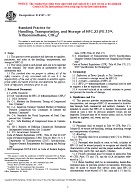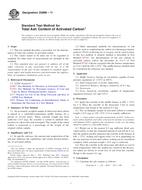1.1 This fire-test-response standard assesses the ability of non-mechanical fire dampers used in vented construction in its open state to limit passage of hot gases, radiation, and flames during a prescribed fire test exposure. The fire exposure condition in this test method is sudden direct flame impingement, which produces these hot gases, radiation, and flames.
Note 1: Non-mechanical fire dampers can be used in vented construction. Vented constructions may be parts of buildings including walls, floors, ceilings and concealed spaces and cavities used for air transfer and to allow ventilation in structures without ductwork. Non-mechanical fire dampers can be located adjacent to combustible construction or materials and situated in exposed or concealed locations, or both. Unlike typical fire resistive assemblies, vented construction uses non-mechanical fire dampers to allow air transfer without the use of ducts. Resistance to flame, radiation, and hot gases may be requirements when direct flame impingement is a credible risk, or when no penetration of flames is required by the authority having jurisdiction, or both. The proposed test method provides procedures that enable an assessment of this direct flame impingement on non-mechanical fire dampers. This test method does not alter any requirements for non-mechanical fire dampers used in fire resistance rated construction and assemblies.
Product Details
- Published:
- 08/01/2017
- Number of Pages:
- 19
- File Size:
- 1 file , 1.3 MB
- Redline File Size:
- 2 files , 3.8 MB


